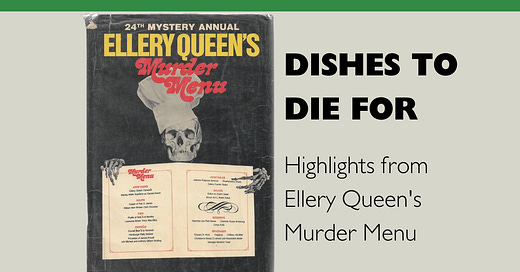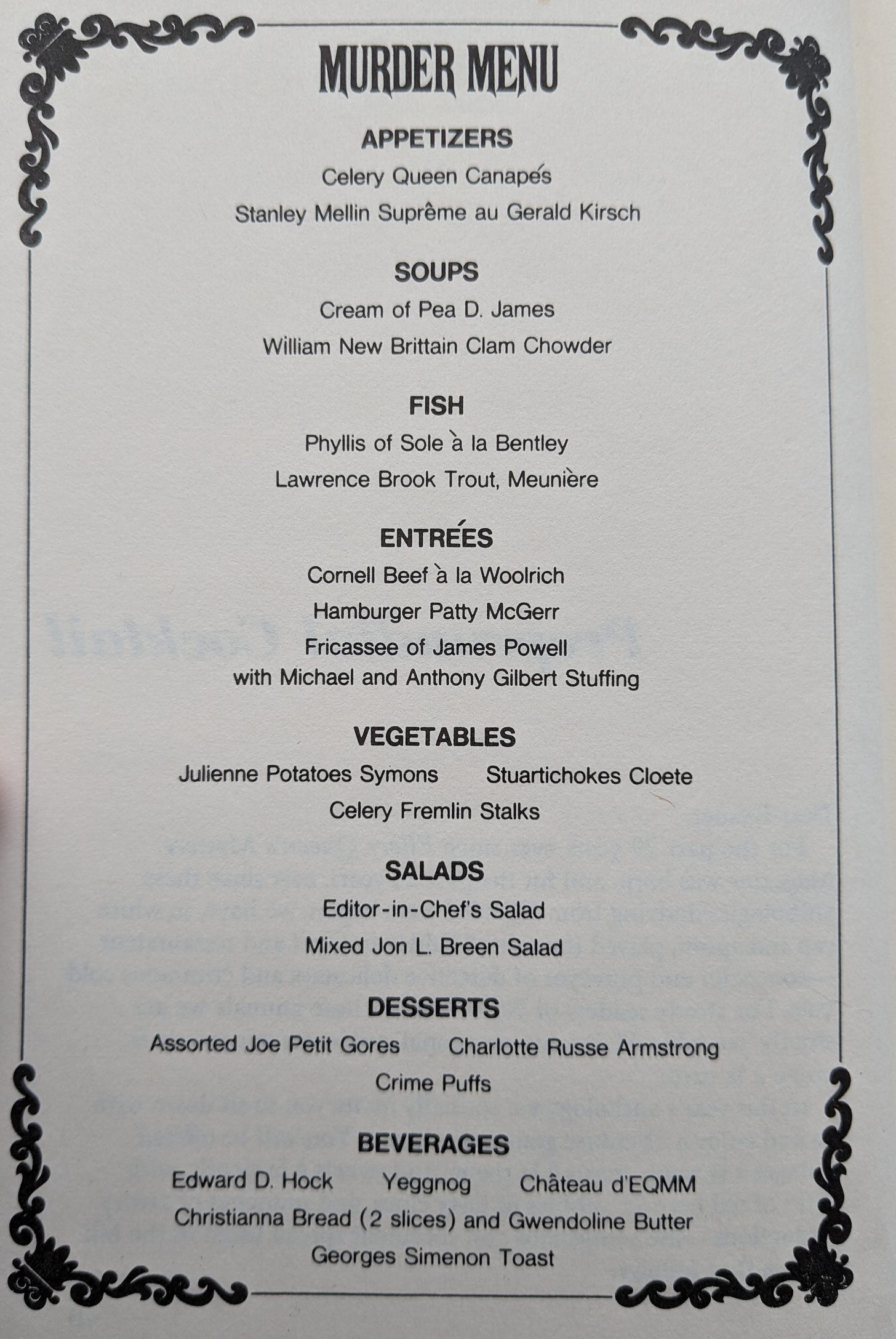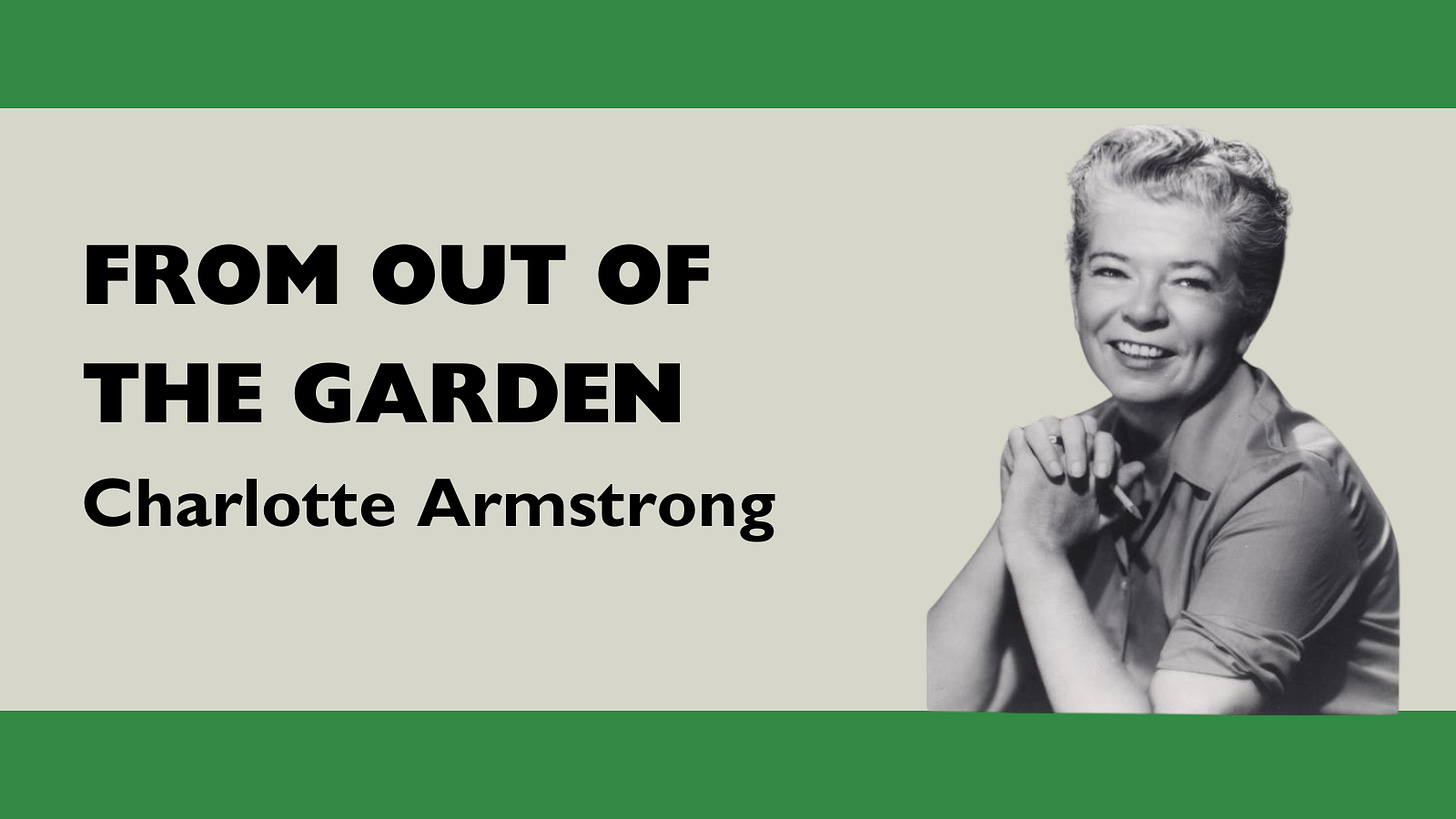Saturday in the Manse is known as “Short Story Saturday”.1 It’s when I like to settle down with a cup of tea in my soon-to-be-replaced-because-it’s-not-in-great-condition armchair and read some shorter crime fiction. My most recent armchair companion has been Ellery Queen’s Murder Menu, first published in 1969.
This was their 24th “Mystery Annual”, in a series that began as The Queen’s Awards in 1946 to showcase annual highlights from their magazine contents. In the UK, the Murder Menu was published by Gollancz, with their typical minimalist styling.2 The American edition, from World Publishing, had a more creative cover:
In their introduction, Ellery Queen promises a “22-course gourmet’s dream”, comprising “potages à la reine, roasts à la rogue, and sweets à la sleuth, with bites of red herring, nibbles of tasty clues, and munches of savory deductions.” Just to make the most of the theme, they also introduce the authors in menu form, featuring (among other delicacies) Cream of Pea D. James soup, Hamburger Patty McGerr, Julienne Potatoes Symons, Christianna Bread and Gwendoline Butter, and Edward Hock.
There are 22 stories in all, about half of which are by American authors, and half are by non-Americans (mostly British writers). Here’s a rundown of my five favourites, most of which you can also read elsewhere if you so desire. (Only after compiling the list did I realise that most of the best stories in this collection are by female authors.)
With a title like “From Out of the Garden”, you know you’re either going to get a slightly unsettling tale of suspense, or a selection of recipes involving homegrown veg. Thankfully, Charlotte Armstrong opted for the first alternative for this story, which was one of her final short stories before her death in 1969. It was later preserved in the 2014 Crippen & Landru collection Night Call and Other Stories of Suspense.
Charlotte Armstrong produced a long line-up of female protagonists across her career. In this case, we’re introduced to Maude Seton, aged 28, “an aggressive and accomplished pest.” If she was born 60 years later, she’d probably have a true crime podcast, but instead she’s a New York journalist convinced she can solve a 15-year-old case involving a disappearing actress, Elizabeth Rose. She’s not an entirely likeable sleuth, yet Armstrong is still able to make us sympathetic to her plight.
Maude Seton’s investigation takes her to the house where Elizabeth Rose lived at the time of her disappearance. The property is still occupied by her third husband, Philip Mortmain, who “seemed very, very male.” There are several aspects of the house, the circumstances and Mortmain’s manner that make Seton suspicious. As she continues digging, the suspense builds up to an unexpected and memorable ending. I enjoyed almost everything about this story, except Maude’s use of the words “toots” and “yah”.
Phyllis Bentley is best remembered as a regional novelist, bringing to life characters from the history of the West Riding of Yorkshire. She also wrote short crime stories, most of which featured amateur detective and novelist Miss Marian Phipps. “The Secret” is one of her non-Phipps stories from Ellery Queen’s Mystery Magazine (which, as far as I can find, has not been reprinted anywhere since).3
The story focusses on the exploits of Simon Emmett, who works in a textile mill with his cousin Harry (and lots of other people). Simon sets his heart on fellow employee Emily Shepherd, but discovers that Harry has already got her “into trouble” (i.e. pregnant). When Harry dies in an industrial accident, Simon decides to make his move, marry Emily and act as the child’s father. This initiates an unfortunate chain of dramatic events, giving Simon more than one secret to cover up.
As the story progresses, Phyllis Bentley makes us feel more of the weight of “the secret” alluded to in the title. “Sometimes, in the years that followed, he felt the burden almost intolerable. It was his first thought in the morning, his last at night: keep the secret.” With each new development, she keeps us guessing how the story will end. Will the secret be revealed? What will the outcome be? And it all leads to a tense final scene, which moves quickly between relief, horror, and joy. But I won’t say more than that — I’ll keep the secret
Mysteriously, Christianna Brand is the only author with two items on the menu — and they are two very different stories. “The Wicked Ghost” is a charmingly witty narrative about a family ghost. “King of the Air” (later reprinted in the Brand anthology What Dread Hand? as “The Kite”) is a hauntingly eccentric vignette about a red kite. Between them, they showcase Brand’s versatile plotting skills.
“King of the Air”, in one sense, is not a mystery at all. We’re introduced to Miss Bellingham, the proud guardian of kites nesting on her land. In time, the nest moves elsewhere, but “his lordship” continues to visit, his movements carefully noted by Miss Bellingham. One snowy April, she finds her isolated home cut off in a “self-created besiegement”. One day, “royalty itself” (i.e. the kite) comes to her remote cottage, and we watch as the relationship between woman and bird develops.
The only mystery at this point is: How will this story end? Yet, in Brand’s capable hands, this is mystery enough. Although the only two characters are a woman and a red kite, the story’s gradual development is riveting, as we follow Miss Bellingham’s actions, thoughts and diary entries. And then we get to the final line, which is surely one of the most memorably chilling lines in all of short fiction. I haven’t seen a red kite for a while, but next time I do, I’m fairly sure I’ll think of this story.
It’s interesting reading “Moment of Power” in its original magazine context, back when P. D. James was still in the relatively early years of crime writing. In fact, this was her first published short story, printed in Ellery Queen’s Mystery Magazine after winning a 1967 Crime Writers’ Association contest sponsored by EQMM. It has since appeared in the P. D. James collection The Mistletoe Murders and Other Stories, under the title “A Very Commonplace Murder.”
The “moment of power” involves Ernest Gabriel, a “seedy old man” with an “air of spurious gentility.” Gabriel revisits a scene from his past, a room where 16 years previously he had developed a regular Friday night ritual, spying on a secret tryst in the building opposite. One Friday night, the assignation was disrupted by assassination, and the woman was murdered. As Gabriel reminisces, he reflects on the dilemma he faced — from his voyeuristic vantage point, he was able to offer eyewitness testimony to prove the key suspect was innocent. But did he want to admit where he was, and why?
This story is a skilful and fascinating study of a disturbing mind. The setup is excellent, and Ernest Gabriel is a convincingly sordid character, who an honest reader will find exasperating and annoying. At one level, the plot follows a simple course, yet P. D. James is still able to obscure the pathway ahead. She may not give us the conclusion we wanted, but it’s an entirely apt ending, with a stunning final line.
James Powell is not an author I’ve read before, although he was a prolific contributor of stories to Ellery Queen’s Mystery Magazine, and twice nominated for a Crime Writers of Canada Award for Best Short Story. "Maze in the Elevator” is an intriguing story, introduced by the editor of this volume with the words: “Either you will wonder why we published this story in Ellery Queen’s Mystery Magazine or you will think it is one of the most penetrating and revealing stories you have read in a long time.” It was later anthologised in A Murder Coming (1990).
As the title suggests, most of the story’s 13 pages take place inside the claustrophobic setting of an elevator.4 Mr Williams finds himself stuck with a strange old man, who makes some incoherent statements about “you people” and “Rodriguez” and “garbage”. As he keeps speaking, Williams discovers the meaning behind his companion’s ravings: the man believes he is the one real human among a cast of actors, he believes his moves are being watched by The Man at the Top, and he believes Williams is part of the conspiracy. The man is clearly deluded… or is he? And how will the elevator journey end?
James Powell gives us a compelling exploration of the trope that would be made famous with The Truman Show in 1998 — an unwitting character living in a fictional world constructed by others. This idea had previously been explored by science fiction writers like Robert Heinlein and Philip K. Dick — I’m not sure if James Powell is the first mystery author to follow their lead. Contrary to Ellery Queen, I would not describe it is as “one of the most penetrating and revealing stories” I’ve read, but it was certainly a captivating narrative.
Have you been reading any interesting short story collections recently? Let me know in the comments!
It isn’t actually. I’ve never referred to it as this until now. But maybe the name will catch on.
My copy is “Published 1972 by Book Club Associates, By arrangement with Victor Gollancz Ltd.” Very nice of Victor to make this arrangement.
Crippen & Landru have reprinted a collection of her Miss Phipps short stories, under the title Chain of Witnesses.
For British readers: an elevator is a lift.












This sounds like a fantastic collection! Looking up the Miss Phipps stories right away. I am currently reading Appleby Talking, a collection of short stories by Michael Innes. In some ways, it reminds me of Miss Marple's Tuesday Night Club; but in this case, the inspector tells all the stories while the vicar and the doctor listen. Some of the stories are good.
Ooh. I didn't realise that Phyllis Bentley had a sideline in detective stories - I will have to investigate!